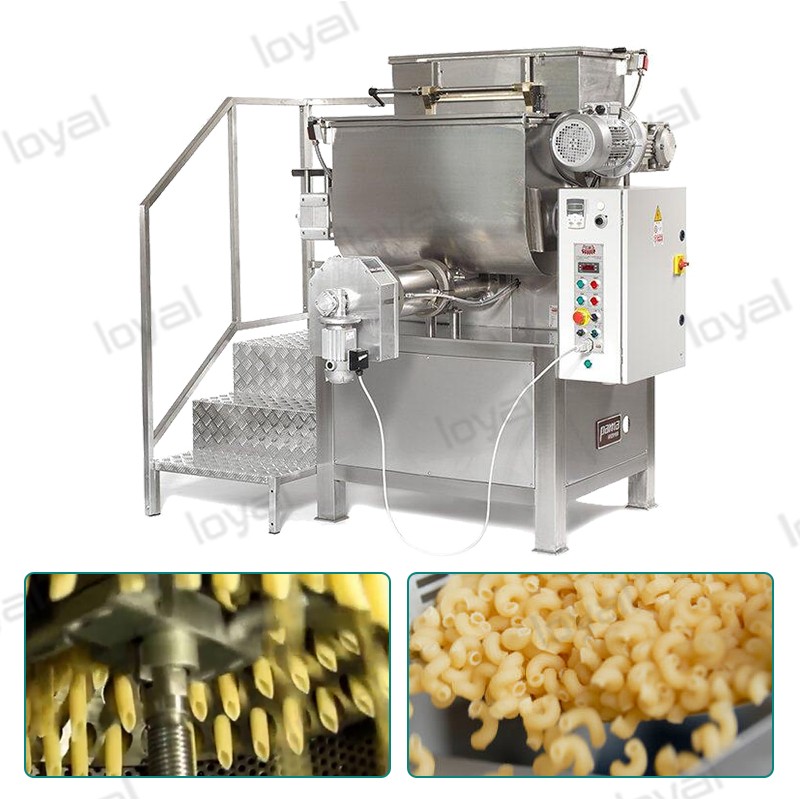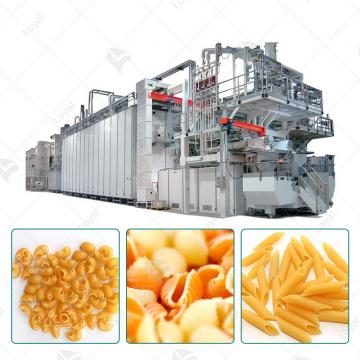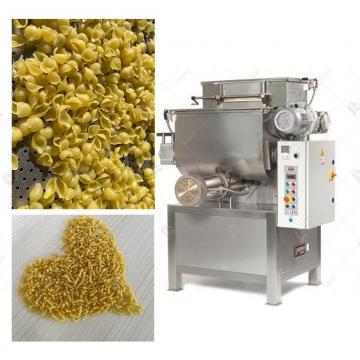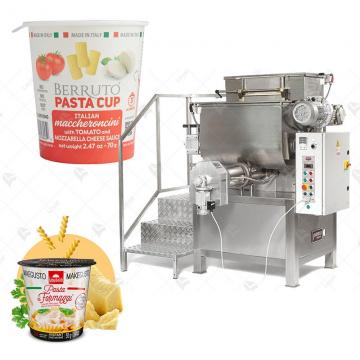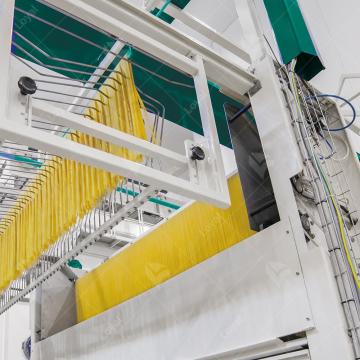The Ultimate Guide To Pasta Manufacturers In 2024
The Ultimate Guide To Pasta Manufacturers In 2024
The macaroni making machine line industry has a rich history dating back centuries, with traditional methods rooted in artisanal craftsmanship. However, as we navigate the demands of the modern era, the need for innovation becomes apparent.Shandong Loyal Industrial Co., Ltd. has incorporated advanced technologies from FAVA and UTF in the production of its macaroni.
In the contemporary landscape of food production, the integration of automation has become pivotal. The efficiency and precision offered by automated systems not only meet the high demands of consumers but also address challenges faced by pasta manufacturers.
This article explores the evolution of pasta manufacturing, highlighting the benefits and challenges associated with fully automated systems. By focusing on technological features and real-world case studies, we aim to elucidate the path towards a sustainable and efficient future for pasta manufacturers.

The Evolution of Pasta Manufacturing
Historically, pasta production involved meticulous manual processes, emphasizing craftsmanship. Artisans carefully crafted each piece, a tradition that contributed to the distinct quality of brands such as Barilla, De Cecco, Creamette, San Giorgio, and Great Value.
The shift towards automation in pasta manufacturing began with the need for increased efficiency and output. The advent of sophisticated machinery and robotics revolutionized the industry, allowing for mass production while maintaining product quality.
Despite the advancements, challenges persist. Pasta manufacturers grapple with issues such as adapting to new technology, initial investments, and ensuring a skilled workforce capable of operating automated systems effectively.
Benefits of Full Automation
Full automation enables pasta manufacturers to significantly increase production speed and output, meeting market demands efficiently. The utilization of advanced machinery allows for a seamless production flow.
Automated systems ensure precise control over every aspect of the production process, leading to consistent quality. This consistency is crucial in maintaining the reputation of renowned brands like Barilla and De Cecco.
By minimizing the need for manual labor, fully automated pasta manufacturing mitigates labor costs and reduces the likelihood of human errors. This not only enhances efficiency but also contributes to overall cost-effectiveness.
The incorporation of energy-efficient components and practices in fully automated pasta manufacturing aligns with sustainability goals. Reducing energy consumption not only benefits the environment but also positively impacts the bottom line.

Technological Features in Fully Automated Pasta Manufacturers
Pasta manufacturers now employ cutting-edge machinery and robotics to streamline production. These technologies ensure precision in shaping and cutting pasta, maintaining the highest standards of quality.
Integrated software solutions play a crucial role in coordinating various aspects of the manufacturing process. This includes inventory management, quality control, and machine maintenance, contributing to overall operational efficiency.
Full automation doesn't just enhance efficiency; it does so sustainably. The use of energy-efficient components and practices reduces the environmental footprint of pasta manufacturing, aligning with global efforts towards a greener future.
Case Studies
Examining case studies of pasta manufacturers who successfully embraced full automation provides valuable insights. Brands like Creamette and San Giorgio have experienced notable improvements in production efficiency and energy savings.
The positive outcomes observed in fully automated pasta manufacturing include increased production capacity, improved product quality, and notable reductions in energy consumption. These successes highlight the tangible benefits for manufacturers adopting automated solutions.
Challenges and Considerations
While the benefits of full automation are evident, pasta manufacturers face initial investment challenges. However, it's essential to view this investment as a strategic move towards long-term efficiency and sustainability.
Adapting the workforce to handle automated systems requires comprehensive training programs. Investing in employee education ensures a skilled workforce capable of maximizing the potential of automated machinery.
Automated systems demand regular maintenance and efficient troubleshooting protocols. Addressing these aspects is crucial to prevent downtime and maintain continuous, high-efficiency production.
Future Trends and Innovations
As technology evolves, the future promises even more sophisticated advancements in fully automated pasta manufacturing. Anticipated developments include enhanced AI integration, predictive maintenance, and further energy-saving innovations.
Collaborations between pasta manufacturers and technology providers can lead to groundbreaking developments. Industry partnerships may drive innovations that revolutionize automated pasta manufacturing, fostering sustainability and efficiency.
Conclusion
In summary, the integration of full automation in pasta manufacturing brings forth benefits such as increased production speed, precision, and energy savings. These advantages not only enhance operational efficiency but also contribute to the overall quality and sustainability of the industry.
As we conclude, it is evident that the future of pasta manufacturing lies in embracing full automation. By addressing challenges, capitalizing on benefits, and staying attuned to emerging trends, pasta manufacturers can pave the way for a sustainable and efficient future. The journey towards fully automated pasta manufacturing is not just a technological advancement but a commitment to a greener, more resilient industry.

FAQs: Common Questions About Pasta Manufacturers
In response to common inquiries about pasta manufacturers, we aim to provide clarity on key aspects of the industry's evolution, challenges, and the transition to full automation.
1. What brands are associated with fully automated pasta manufacturing?
Fully automated pasta manufacturing has been embraced by renowned brands such as Barilla, De Cecco, Creamette, San Giorgio, and Great Value. These industry leaders have adopted automation to enhance efficiency and maintain product quality.
2. How does full automation contribute to sustainability?
Full automation in pasta manufacturing incorporates energy-efficient components and practices, resulting in reduced environmental impact. By minimizing energy consumption and waste, manufacturers contribute to the industry's overall sustainability.
3. What challenges do pasta manufacturers face in adopting full automation?
Pasta manufacturers encounter challenges such as initial investment costs, workforce training, and the need for effective maintenance protocols. Overcoming these challenges requires strategic planning and a commitment to long-term efficiency.
4. Can fully automated systems accommodate traditional pasta-making methods?
Fully automated systems are designed to streamline and optimize the pasta production process. While rooted in innovation, these systems can still honor traditional methods by maintaining the quality and craftsmanship associated with artisanal pasta.
5. What are the future trends in fully automated pasta manufacturing?
Anticipated advancements include increased AI integration, predictive maintenance, and ongoing efforts to enhance energy efficiency. Collaborations between manufacturers and technology providers are expected to drive industry-wide innovations.
6. How can pasta manufacturers ensure a skilled workforce for automated systems?
Pasta manufacturers can ensure a skilled workforce by investing in comprehensive training programs. By educating employees on the operation and maintenance of automated machinery, manufacturers empower their teams to navigate technological advancements effectively.
7. What role do case studies play in understanding the benefits of full automation?
Case studies provide real-world examples of successful implementation, offering insights into the tangible benefits experienced by pasta manufacturers. Brands like Creamette and San Giorgio serve as benchmarks for the positive outcomes achievable through full automation.
8. How does the integration of robotics contribute to pasta quality?
The integration of cutting-edge machinery and robotics ensures precision in shaping and cutting pasta, contributing to consistent product quality. This technological advancement enhances the overall efficiency of the pasta manufacturing process.
9. Is the initial investment in full automation justified in the long run?
While the initial investment in full automation may seem significant, it is a strategic move towards long-term efficiency and sustainability. The benefits, including increased production capacity and energy savings, justify the investment over time.
10. How can pasta manufacturers contribute to a sustainable future?
Pasta manufacturers can contribute to a sustainable future by embracing full automation, implementing energy-efficient practices, and actively participating in industry collaborations. This commitment to sustainability is essential for the long-term resilience of the pasta manufacturing sector.

